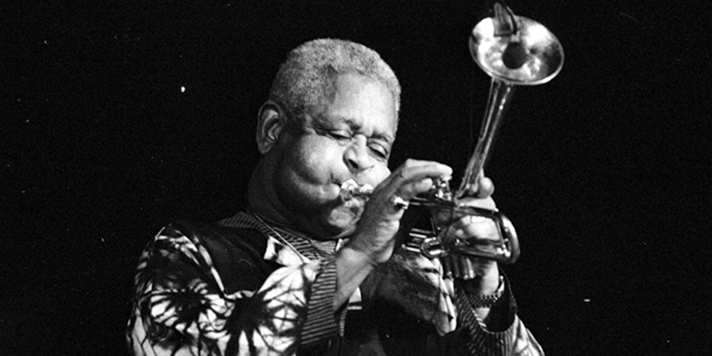John Birks Gillespie, later known as Dizzy, was born in 1917 to James and Lottie Gillespie. He was the youngest of nine children. His father, James, was a local bandleader, and so, instruments and music were always available to young Dizzy at an early age.
Dizzy Gillespie first began music by studying piano. He later taught himself the trombone, and then, at the age of 12 he switched to the trumpet. It was with this instrument that he would go on to not only be one of the leading figures in bebop, but in Latin and Afro-Cuban jazz. But it wasn’t only as a musician that he became notable. In addition to his playing, he is well known for his unique embouchure, style of dress, bent trumpet, and scatting.
In 1935 Dizzy earned his first professional gig with the Frank Fairfax Orchestra. He later became a member of Teddy Hill’s orchestra where one of his greatest influences was a former member (Roy Eldridge). After touring and recording with Hill, Gillespie joined Cab Calloway’s orchestra where he began to establish a name for himself as a performer. Due to growing distaste with Gillespie’s solo style and an incident involving a spitball (which was reportedly not thrown by the accused), Dizzy was fired.
Gillespie then moved through a number of bands including that of Ella Fitzgerald, Coleman Hawkins, et al. He also wrote arrangements for groups belonging to Jimmy Dorsey and Woody Herman. In 1942 he joined Earl Hines’ band where Charlie Parker was also a member. It was during this time that he wrote “A Night in Tunisia.” When Billy Eckstine, the vocalist in Hines’ group, left the band, Bird and Dizzy followed. In 1945 Gillespie and Parker recorded songs including “Salt Peanuts,” “Hot House,” and “Groovin’ High.” The two eventually parted ways, but until Parker’s death, they occasionally reunited for performances.
Dizzy also toured as part of Jazz at the Philharmonic and led various combos that featured performers such as John Coltrane and Milt Jackson. In 1956 he formed a big band and began touring outside of the US. Members of this group included Benny Golson, Wynton Kelly, and Lee Morgan.
In the 1970s Gillespie toured as a part of the Giants of Jazz, but his trumpet playing began to deteriorate. He remained active, albeit inconsistently until 1992. He passed away due to pancreatic cancer in 1993 at the age of 75.
